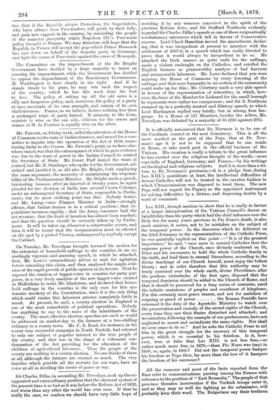Sir Charles Dilke, in seconding Mr. Trevelyan, took up the
ex- aggerated and extraordinary position that the electoral system of the present time is as bad as it was before the Reform Act of 1832, and woree than any other the world has ever seen. If that be really the case, we confess we should have very little hope of
mending it by any measure conceived in the spirit of the previous Reform Acts ; and Sir Stafford Northcote evidently regarded Sir Charles Dilke's speech as one of those enigmatically revolutionary utterances which tell in favour of Conservative reserve. Lord Claud Hamilton moved the amendment, declar- ing that it was iriexpedient at present to interfere with the- settlement of 1867-8, in a speech which was really directed to prove that it would always be inexpedient to do so. He attacked the Irish masses as quite unfit for the suffrage, made a violent onslaught on the Catholics, and extolled the English farmers as praiseworthy martyrs of bad harvests and unreasonable labourers. Mr. Lowe declared that you were injuring the House of Commons by every lowering of the suffrage, and that mere humanity to no section of the community could make up for this ; Mr. Courtney made a very able speech in favour of the representation of minorities, in which, how- ever, the fears of the Member for Liskeard for the small borough he represents were rather too conspicuous ; and Sir S. Northcote summed up in a perfectly neutral and dilatory speech, to which Lord Hartington replied very briefly, but in strong, firm lan- guage. In a House of 517 Members, besides the tellers, Mr. Trevelyan was defeated by a majority of 65 (226 against 291).


































 Previous page
Previous page